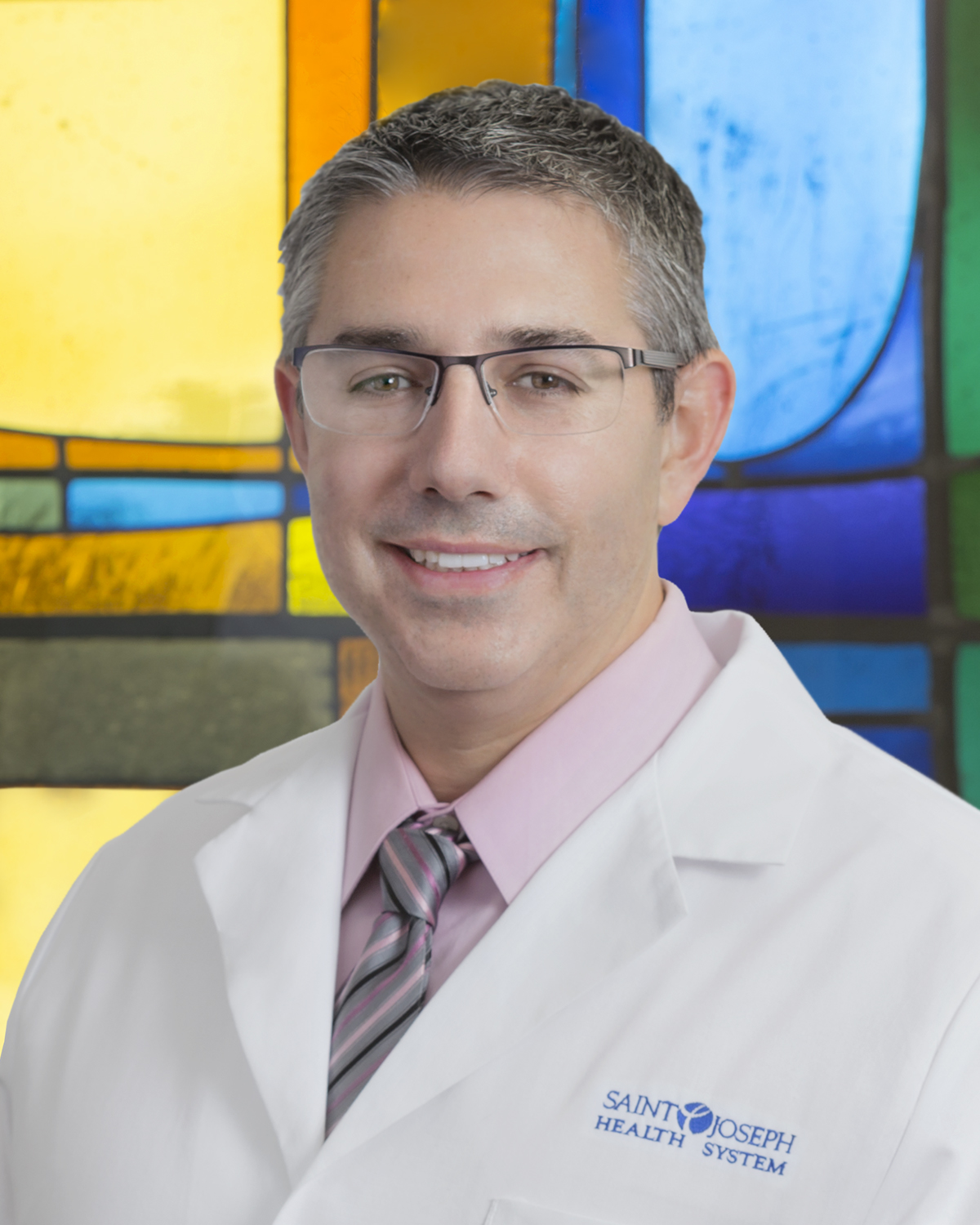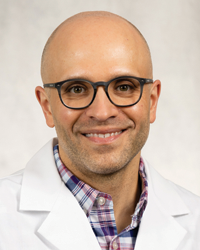Men’s Health at Saint Joseph Health System
Saint Joseph Health System offers diagnosis and treatment for the entire spectrum of men’s healthcare needs. From urinary and prostate problems to sexual dysfunction, our team is highly skilled in the most advanced therapies to help you recover quickly and improve your long-term health.
We diagnose and treat cancers of the urinary tract – kidney, prostate, bladder, and testicular cancers – using the most advanced treatments.
- da Vinci Robotic Surgical System is the most advanced treatment in the region for kidney, prostate and bladder cancers and is less invasive and less painful while offering shorter hospital stays and faster recovery.
- Laparoscopic and endoscopic surgery is used to manage cancer, kidney stones and incontinence and treatment for benign prostate gland enlargement.
- BCG (Bacillus Calmette-Guerin) injections are used to treat bladder cancer.
Conditions and Treatments
Kidney Stone Disease
We diagnose kidney stones through X-rays, CT scans, and ultrasounds and may use blood and urine tests to check kidney function.
Depending on the size and location of the kidney stone, our team can determine whether they need treatment. Although painful, many kidney stones will pass on their own and cause no permanent damage. Anti-inflammatory medications and pain relievers can be prescribed to make passing the stone less painful. Another treatment is a procedure called ureteroscopy and laser lithotripsy where small lasers are used to break up the kidney stones and remove them.
Prostate Enlargement
Men often feel that problems urinating from an enlarged prostate are just a part of aging, but there are many treatments available to help. We screen patients for Benign Prostatic Hyperplasia (BPH) and build a care plan based on your age, prostate size, overall health, and level of discomfort. Treatment may include medication or the advanced UroLift® System treatment, which uses small implants to hold open the obstructed pathway blocking the flow of urine.
Erectile Dysfunction
Erectile dysfunction is a urology condition and is an inability to attain and maintain an erection during sexual activity. It is common with aging and has many risk factors:
- Alcohol and/or tobacco abuse
- Anxiety, stress and/or depression
- Being underweight or overweight
- Certain medications, including blood pressure medication, antidepressants, appetite suppressants, and sedatives
- Diabetes mellitus
- Injured, clogged, or blocked blood vessels in or to the penis
- High blood pressure and/or cholesterol
- Low testosterone
- Multiple sclerosis
- Parkinson's disease
- Sleep deprivation or disorders
- Peyronie’s disease (the presence of scar tissue within the penis)
We develop an individualized plan to improve your overall health and treat the erectile dysfunction, which may include medications to increase blood flow to the penis. Weight loss, exercise, and quitting tobacco and alcohol use can reduce the risk, and mental health treatment can help reduce associated feelings of anxiety and depression.
Low Testosterone
Low testosterone is a condition when the testicles do not produce enough testosterone, the hormone necessary for normal male sexual function. Testosterone helps develop and maintain adequate levels of red blood cells which keeps bones strong, aids in thinking skills, and boosts mood. Decreased energy or loss of muscle mass can be a sign of low testosterone levels.
We diagnose low testosterone through a physical exam and blood tests to measure testosterone levels and create a personalized treatment plan, which may include testosterone replacement therapy. This kind of therapy is not always the best first course of action, and treatment may begin by addressing the source, such as weight gain or other medications.
Urinary Tract Cancers and Treatment
Blood in the urine is often the first sign of a urinary tract tumor and should never be overlooked.
Kidney cancer and bladder cancer are often diagnosed in their early stages, making treatment possible and recovery likely. Treatment frequently involves one or a combination of minimally invasive surgery, chemotherapy, radiation therapy, and immunotherapy.
Signs and symptoms begin in the cancers’ early stages and include:
- Blood in the urine
- A painful urge to urinate
- Lower back and side pain, sometimes accompanied by fever
- Unexplained weight loss and/or fatigue
- Decreased or loss of appetite
- Abdominal lumps or pelvic pain
Bladder cancer and kidney cancer are preventable in some cases through lifestyle choices like eating large amounts of fruits and vegetables, avoiding alcohol and tobacco, and exercising regularly.
Prostate cancer is one of the most common forms of cancer in men and is generally treatable. The American Cancer Society recommends prostate cancer screening for most men beginning at age 50 to help diagnose prostate cancer in the early stages.
Treatment depends on how advanced prostate cancer is when diagnosed and may include robotic surgery, radiation, or hormone therapy. For some prostate tumors, PSA (prostate specific antigen) management may be recommended to monitor the cancer instead of treating it right away. Depending on the stage of development, we may also recommend Lupron/Eligard injections to treat prostate cancer.
Testicular cancer is one of the most common forms of cancer in men between the ages of 15 and 35 and is also one of the most treatable and curable cancers. Monthly testicular self-exams after reaching puberty are important to help detect testicular cancers.
Treatment may include a combination of chemotherapy and radiation therapy, lymph node surgery and removal of the tumor and affected testicle.
Our Providers
Saint Joseph Urology offices provide convenient locations in the Medical Office Building on Douglas Road adjacent to Mishawaka Medical Center and the Medical Office Building at Plymouth Medical Center.
 Adam Perlmutter, DO Urology Plymouth, Indiana |
 Anthony Gauthier Jr., MD Urology Mishawaka, Indiana |
 Can Talug, MD Urology Mishawaka, Indiana |
 Zaid Farooq, DO Urology Mishawaka, Indiana |

